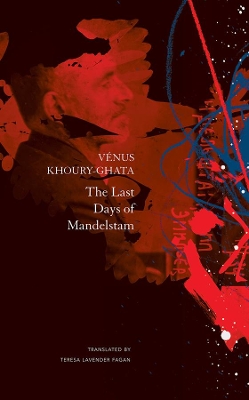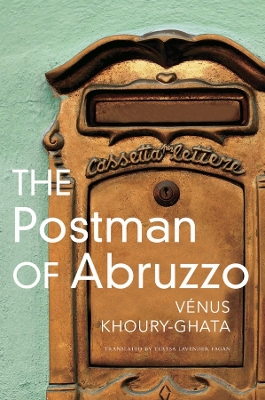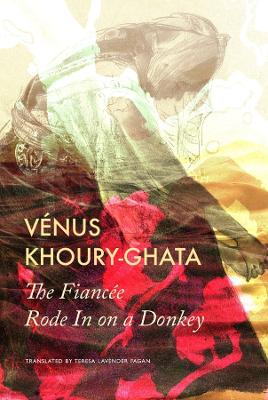French List
3 total works
The year is 1938. The great Russian poet and essayist Osip Mandelstam is forty-seven years old and is dying in a transit camp near Vladivostok after having been arrested by Stalin’s government during the repression of the 1930s and sent into exile with his wife. Stalin, “the Kremlin mountaineer, murderer, and peasant-slayer,” is undoubtedly responsible for his fatal decline. From the depths of his prison cell, lost in a world full of ghosts, Mandelstam sees scenes from his life pass before him: constant hunger, living hand to mouth, relying on the assistance of sympathetic friends, shunned by others, four decades of creation and struggle, alongside his beloved wife Nadezhda, and his contemporaries Anna Akhmatova, Marina Tsvetaeva, Boris Pasternak, and many others.
With her sensitive prose and innate sense of drama, French-Lebanese writer Vénus Khoury-Ghata brings Mandelstam back to life and allows him to have the last word—proving that literature is one of the surest means to fight against barbarism.
With her sensitive prose and innate sense of drama, French-Lebanese writer Vénus Khoury-Ghata brings Mandelstam back to life and allows him to have the last word—proving that literature is one of the surest means to fight against barbarism.
A lyrical novel concerning belonging, foreignness, and ethnicity.
Following the path of her late geneticist husband, Laure arrives in the town of Malaterra in the harsh mountains of Abruzzo in Italy, where her husband was studying the close-knit Albanian inhabitants. At first an intruder, she is gradually accepted by the population, which is made up of amusing, eccentric characters. Among them: Helena, who hanged her dishonored daughter from the fig tree in her garden, and who has been waiting for thirty years with her gun for her daughter’s rapist to return; the Kosovar, a distrusted bookseller languishing in his dusty shop; Mourad, the baker, who proposes marriage to Laure and every other woman who enters his bakery; and Yussuf, the postman, who makes his rounds even if there is no mail to deliver. We also meet the unfortunate assailant who returns from his exile to reclaim and restore his family home. With humor and compassion, this book brings to life the inhabitants of a small, remote town in the mountains of Abruzzo.
Following the path of her late geneticist husband, Laure arrives in the town of Malaterra in the harsh mountains of Abruzzo in Italy, where her husband was studying the close-knit Albanian inhabitants. At first an intruder, she is gradually accepted by the population, which is made up of amusing, eccentric characters. Among them: Helena, who hanged her dishonored daughter from the fig tree in her garden, and who has been waiting for thirty years with her gun for her daughter’s rapist to return; the Kosovar, a distrusted bookseller languishing in his dusty shop; Mourad, the baker, who proposes marriage to Laure and every other woman who enters his bakery; and Yussuf, the postman, who makes his rounds even if there is no mail to deliver. We also meet the unfortunate assailant who returns from his exile to reclaim and restore his family home. With humor and compassion, this book brings to life the inhabitants of a small, remote town in the mountains of Abruzzo.
A lyrical novel with a poetic narrative about an overlooked individual in Arab African history.
For two days the rabbi rides on a donkey to find the ideal fiancée. Legs and arms shaved, hands dyed with henna, a girl to be married must shine like a mirror. Every girl hopes to be the chosen one and ride off on a donkey to live in the city. The desert is the domain of men; they believe they see oases and palm trees sagging with fruit, while women see only sand on top of sand. A rapid look-around at the girls in the circle was enough for the traveling rabbi to find the right one. He chooses Yudah because of her name, a contraction of Yahuda, and because she lowered her eyes when he looked at her.
The Fiancée Rode In on a Donkey tells Yudah’s story. Instead of experiencing her dream of being chosen and riding off on a donkey to live in a palace, she finds herself in an encampment of tents swaying in the wind. She also doesn’t find the Emir, who is battling on other fronts and soon surrenders. Yudah and the rest of his followers are exiled to Ile Sainte-Marguerite, where she pursues a tireless quest for her future husband in France, seeking a man she has never seen. Will the fantastic destiny of the young girl from the desert ever be fulfilled?
In lyrical novel after novel, Vénus Khoury-Ghata chooses overlooked individuals from history and brings them back to life on the page. Hauntingly unforgettable, The Fiancée Rode In on a Donkey is yet another poetic narrative from one of the most respected French authors of our times.
For two days the rabbi rides on a donkey to find the ideal fiancée. Legs and arms shaved, hands dyed with henna, a girl to be married must shine like a mirror. Every girl hopes to be the chosen one and ride off on a donkey to live in the city. The desert is the domain of men; they believe they see oases and palm trees sagging with fruit, while women see only sand on top of sand. A rapid look-around at the girls in the circle was enough for the traveling rabbi to find the right one. He chooses Yudah because of her name, a contraction of Yahuda, and because she lowered her eyes when he looked at her.
The Fiancée Rode In on a Donkey tells Yudah’s story. Instead of experiencing her dream of being chosen and riding off on a donkey to live in a palace, she finds herself in an encampment of tents swaying in the wind. She also doesn’t find the Emir, who is battling on other fronts and soon surrenders. Yudah and the rest of his followers are exiled to Ile Sainte-Marguerite, where she pursues a tireless quest for her future husband in France, seeking a man she has never seen. Will the fantastic destiny of the young girl from the desert ever be fulfilled?
In lyrical novel after novel, Vénus Khoury-Ghata chooses overlooked individuals from history and brings them back to life on the page. Hauntingly unforgettable, The Fiancée Rode In on a Donkey is yet another poetic narrative from one of the most respected French authors of our times.


